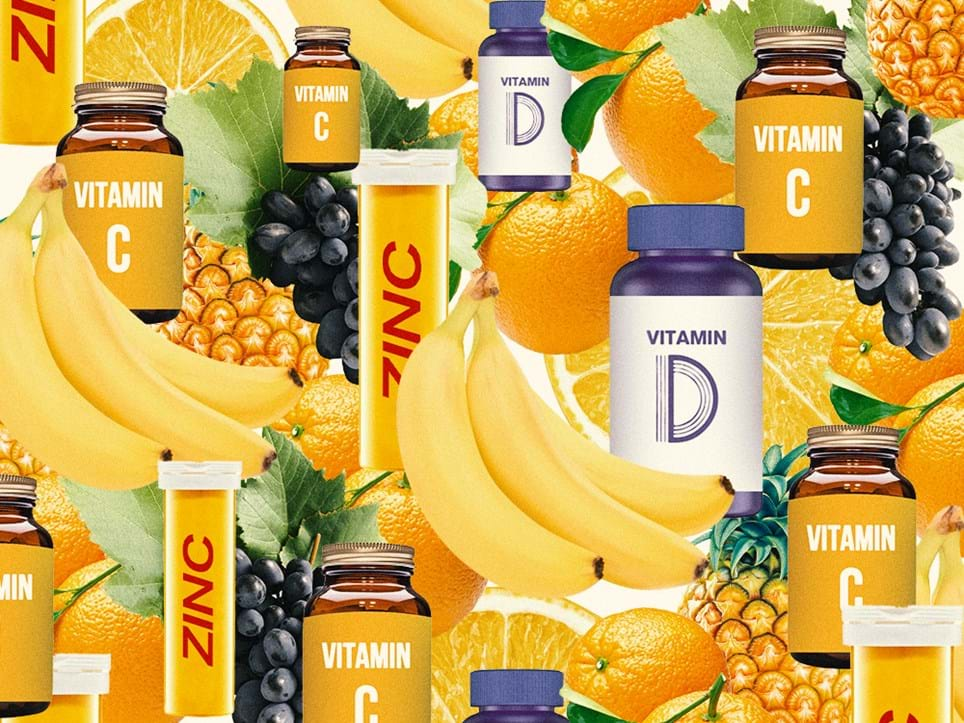Carmen Bellot investigates what vitamins we should dose up on.
My inquisitiveness has been a saving grace during lockdown. My need to accumulate knowledge has sent me through many Coronavirus-related rabbit holes, and while it's kept my mind active, I – in the words of Bono – still haven't found what I'm looking for. Even a true media hermit wouldn't have missed all the advice that's been thrown at us; 'social distancing' and 'stay inside' now feature heavily within my dreams, but I still can't find clear answers on how to keep my immune system strong.
As purveyors of nutritional health; the team at REVIV seemed the perfect physicians to call for some advice on keeping my body's defencies running A-OK. Dr Pascale Ricci, is one of the 750 staff members that have been redeployed to work on the REVIV COVID-19 Global Support Centre, available for anyone who needs advice and support on preventative health measures, reducing exposure, the symptoms of COVID-19 and how to best manage those symptoms; provided by their medical professionals. From phoneline to video call, Dr Ricci offers us her medical advice on how stay healthy.
What are the best vitamins to take to keep your immune system healthy?
Vitamin D
It's vital for optimum immune function. Indeed there have been studies demonstrating an inverse association between vitamin D status and the susceptibility and/or severity of rheumatoid arthritis and other autoimmune diseases. Supplementing the diet with vitamin D is recommended for everyone, especially during the winter months, or when we are being advised to remain indoors, when exposure to natural sunlight is lacking and intake from the diet is not possible alone.
Vitamin C
It plays a large role in immunity, firstly by protecting the cells of the immune system from oxidative stress, but also to stimulate the production and function of white blood cells. This is thought to be one reason why vitamin C supplementation has been shown to shorten the duration of the common cold.
Zinc
It forms part of the structural component of hundreds of essential molecules, plays a key role in enzyme function, protein synthesis and wound healing. It also assists in the production of haemoglobin, the oxygen carrying component of red blood cells. 
Are there any particular foods that contain these or similar vitamins that we should be eating?
Dark green, leafy vegetables. Your golden three are broccoli, kale and spinach. You will find Vitamin D in fortified foods, eggs, mushrooms and oily fish. Food sources rich in zinc include shellfish, lean meat, beans, quinoa, as well as nuts and seeds.
Are there any other vitamins that we should be taking if we do get sick?
Antioxidants are essential for our bodies to neutralise free radicals and reduce oxidative stress, especially at times of increased burden to your body if you do become unwell. Antioxidant supplements such as coenzyme q10 and alpha lipoic acid can be found over the counter in most health-food shops. Another important antioxidant is vitamin A. It is important for maintaining a healthy immune system, food sources include oily fish, eggs, butternut squash, peppers, carrots, mangoes and again! dark green leafy vegetables. 
What are your tips for staying healthy during the Coronavirus outbreak?
Nutrition
It is more important than ever to boost the nutritional status of your food through cooking from scratch. Processed foods should be avoided if at all possible as these not only lack essential nutrients, but also have high concentrations of preservatives and pesticides that require detoxification.
Exercise
During illness it may not always be possible to exercise, however if self isolating and asymptomatic or suffering with mild symptoms, we should all aim to complete 20mins of exercise daily. Immune function can be improved by regular exercise. Exercise has been shown to help to repair DNA and this can ensure that the body's cells operate normally. Exercise releases endorphins and is therefore a great way to boost mood as well, something particularly important in these times of isolation.
Sleep
As an adult, 8 hours sleep is required to make sure that the body has ample time to detoxify, rest and recover if asymptomatic. People who sleep less than 8 hours, and especially those regularly sleeping less than 6, are found to be at increased risk of developing disease and chronic illnesses.
Click here to schedule a free consultation with the REVIV medical staff.
More More More!
+ Dr Tara Swart explains how success is just one smell away...
+ Caroline Issa on her trip to the Eudelo skin clinic...
+ Surprise Me!







